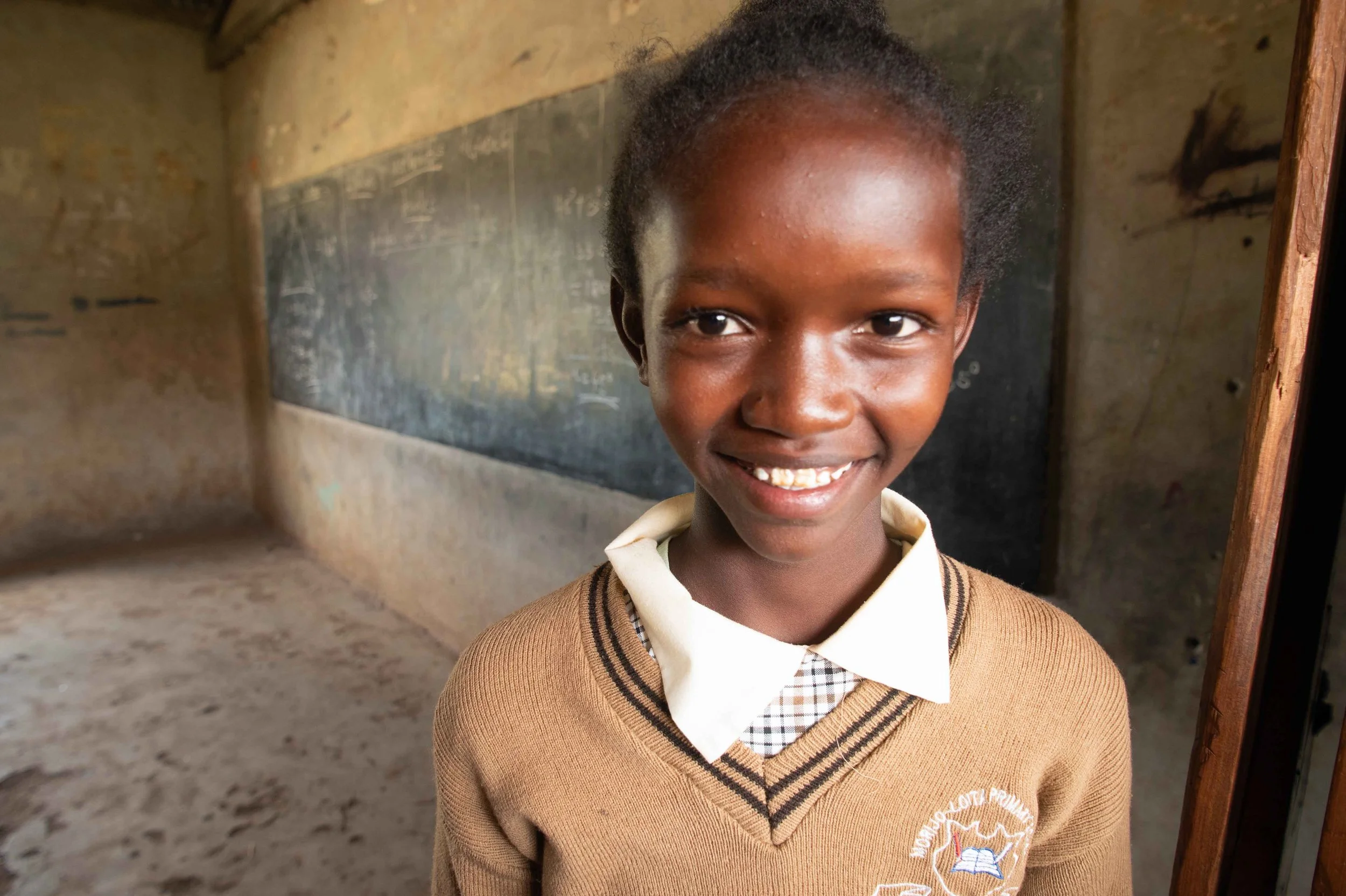CORE PROGRAMS
We work in a region of Kenya that has been labeled as “not wanting education”. Our experience shows us the opposite: that many Maasai parents recognize the value of education and desire it for their children. We work with them to address barriers of access to affordable education, especially those experienced by girls. Our core programs leverage latent community knowledge and assets to enroll and keep children in school through secondary, an approach that ensures our work is low-cost, scalable, and sustainable long after we’re gone.
We focus on the key interventions described below.
PRIMARY SCHOOL ENROLLMENTS
We target rural regions where school enrollment is low and then identify out-of-school children, sensitize their parents to the value of education, and make it easier for them to enroll their children in school. We do this work through an intern program which also creates opportunity for local young women. Our Team Angaza interns have enrolled over 2,400 children into classrooms since schools reopened from COVID-closures in 2021. An independent audit showed retention of the first 1000 children was over 75%, a very high rate for this region, and we are currently tracking the next 1000 that were enrolled.
OPENING AFFORDABLE DAY SECONDARY SCHOOLS
Research shows the greatest predictor of whether a girl will attend secondary school is a nearby affordable school. But in many rural areas such as the Loita Hills where we work, they simply don’t exist: there may not be a school within tens of miles of terrain, leaving few options for children to transition on to secondary school. We identify key central primary schools that can be expanded into secondary schools to increase access to education. As of May, 2025, we have started nine new day secondary schools in partnerships with remote communities across the Loita and Naikarra regions.
SUPPORTING SCHOOLS WITH CRITICAL LEARNING RESOURCES
Schools in the rural region we work have very few resources; historically teachers have only a handful of tattered textbooks for support. We support them with critical items like solar panels and Rachels - Remote Area Community Hotspots for Education and Learning: Portable, battery-powered devices that contain hundreds of free lessons from educational websites in offline format that they can wirelessly transfer to nearby tablets, laptops, in regions where little internet exists.
GRANT SUPPORT FOR NEW SECONDARY SCHOOLS
New secondary schools in Kenya experience significant economic vulnerabilities in their first years of operations. The Kenyan Government only kicks in major support once they are built out and officially registered. Our grant program supports our partner secondary schools with a funding grant to cover teachers’ salaries during their first year of operation and additional second-year grants, if needed, to ensure their sustainability.
ACTIVATING LOCAL LEADERSHIP
Parents are more likely to send their children in school if people they respect support education. We work with local political, cultural and religious leaders to explore the connections between education and culture so they may use their influence to encourage parents to send all their children, including their girls, to school. We then support them once they’re there through enhanced classroom resources, mentors and encouraging the hiring of female teachers.
PADS AND REPRODUCTIVE HEALTH (SHRH) EDUCATION
Ten years ago, we started our work by addressing the barrier to school attendance created by lack of sanitary pads and sexual and reproductive health and rights (SHRH) education. We paused this work for several years after we relocated our work to remote regions where lack of school infrastructure and historical norms of early marriage created even larger barriers. Now that we’ve made significant progress in increasing girls’ school enrollments and attendance and partnered with communities to start five day secondary schools in these regions, we’ve reintroduced our pad and SHRH education program. This work is carried out by our Team Angaza interns as they engage in their outreach work to families.
Since 2015, we have distributed over 5,000 pads to girls in various regions of rural Kenya. In 2024 alone, Team Angaza distributed over 1,000 reusable pads to girls across southern Kenya’s remote, high-need Olderkesi region.
Pilot Programs
We are continually evaluating our impact and the most pressing needs of the communities we serve – and creatively responding. Below are initiatives we are currently or have previously piloted to increase our support of Maasai childrens’ abilities to go to, and stay in, school.
PARTICIPATORY VIDEO (PV)
Participatory Video is a powerful tool increasingly used around the world to help people narrate their concerns, hopes, and challenges and mobilize to find solutions through video. It’s been used as a peace-building tool in post-conflict communities in Sierra Leone and Kyrgyzstan and as a tool to imagine solutions to global weather changes by indigenous communities in Canada, Ethiopia, Nepal, and Peru. In a pilot PV project we implemented in Loita in 2024, we used video as a tool to raise girls’ awareness about teen pregnancy and its relationship to their futures. Our Team Angaza volunteers interviewed local teenagers to learn their stories, hopes for their futures on camera. Their collective voices were then edited into a single video shared by Team Angaza to girls across Loita and Naikarra. The impact was quite powerful, and we’re planning an expansion of this program to Naikarra in 2025. Read more through this link.
HEALTH TRAININGS
People living in the rural regions of Kenya where we work have little access to health care. There is a small scattering of dispensaries and small clinics but advanced and emergency care, imaging, and diagnostic labs are many hours away over rough dirt roads and tracks that become impassable during when rivers flood during the heavy rains. Add in poverty, high rates of early marriage and pregnancy among Maasai, and lack of access to clean water and the mix ends up being devastating to countless Maasai lives.
In 2025, several life-threatening medical emergencies experienced by our own volunteer Team Angaza volunteers sparked out decision to launch a series of trainings to raise awareness among our Kenyan staff and volunteers about diets as preventative health; prenatal care and obstetric emergency recognition, gendered health challenges and waterborne disease and sanitation; they then share this information more widely with women and girls in our partner communities. Taught by a Maasai R.N. who grew up in one of our partner villages, these trainings are already having a significant ripple effect, encouraging many girls to go for prenatal visits; identifying severe cases of anemia, and connecting women to free surgery for obstetric fistula.
COMMUNITY FACILITATION: LOITA HILLS
The Maasai’s historical pastoral way life in Kenya’s Loita Hills began another significant change in 2024 due to a land demarcation process that parceled up and handed out Loita’s historically communal land into 9–13-acre portions.We decided to walk with the Loita community in navigating this major shift by supporting locally driven awareness campaigns that helped educate Loita Maasai on the ways the demarcation process worked and the ways it might impact their lives. We also funded a locally guided community wide facilitation framework through which the Loita Maasai have been able to articulate their own vision for their collective future – and draft temporary guardrails to prevent exploitative speculative selling of their historically communal lands, especially ecologically sensitive and culturally important areas. The decisions made now around land rights have far-reaching consequences for the entire Loita community, with significant impacts on the young girls we are working to empower. No other area of Maasailand has faced land privatization, a process that rubs against the deepest aspects of Maasai culture, with such conviction to hold on to their culture and identity.
EMERGENCY SUPPORT AND SCHOLARSHIPS FOR GIRLS AND FAMILIES
To have the greatest impact, our programs focus on supporting entire schools and communities rather than individual students. Occasionally, however, we come across a situation in which an immediate hardship might result in a girl dropping out of school. We maintain a small pool of funds available to intercede in these situations. Distributions have an immediate impact and offer bridge support that has kept many girls in school. Meet some of the girls who our emergency support and scholarships have supported by clicking the links below:
COMMUNITY TREE PLANTING
In 2023 we began partnering with students, teachers and families in communities where we are building new schools to offset the impact of trees harvested for classroom construction by planting native tree seedlings. As of August, 2023 we planted 200 seedlings each near new schools in the villages of Mausa and Olmesutie and plan to continue this program in all communities where we are building new schools. This program was put on hold in 2024 while we assess its continued viability and impact.











